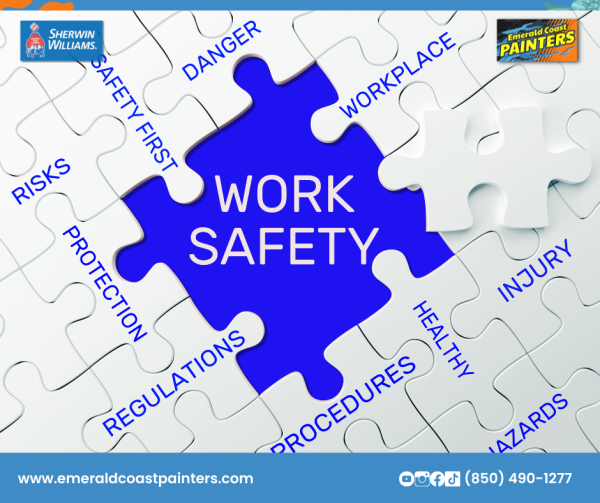Blog 21
Painting Safety 101: Must-Know Precautions
Embarking on a painting project can be an exciting way to transform your living spaces. However, before you pick up that brush, it's essential to prioritize your safety. In this post, we'll cover crucial precautions to ensure a safe and successful painting experience.

1. Ventilation Matters
Paints emit volatile organic compounds (VOCs), which can be harmful when inhaled in large quantities. Ensure proper ventilation by opening windows and using fans. Consider using low-VOC or zero-VOC paints to minimize health risks.
2. Protect Your Skin and Eyes
Paint can irritate your skin and eyes. Wear protective clothing like long sleeves, gloves, and safety goggles. In case of contact, immediately wash the affected area with water and seek medical attention if irritation persists.
3. Mindful Material Handling
Store paint cans away from heat sources and flames. Keep them tightly sealed to prevent spills. When pouring paint, use a funnel to avoid drips. Dispose of paint cans and materials responsibly according to local regulations.
4. Stepladder Safety
When working on elevated surfaces, always use a sturdy stepladder. Ensure it's on a level surface, and don't stand on the top step or overreach. This prevents accidents and ensures your stability while painting.
5. Mind the Fumes
Some paints release strong fumes that can cause dizziness or headaches. If you experience these symptoms, take a break and step into fresh air. If the symptoms persist, consult a medical professional.
FAQs About Painting Safety
Q1: Can I paint without using safety gear?
A1: It's highly recommended to wear safety gear, including goggles, gloves, and appropriate clothing, to prevent skin and eye irritation.
Q2: Are all paint fumes harmful?
A2: While not all paints emit harmful fumes, it's best to ensure proper ventilation and choose low-VOC paints to minimize risks.
Q3: How do I dispose of leftover paint?
A3: Check with your local waste disposal guidelines. Some areas have paint recycling programs, while others require you to dry out the paint before disposal.
Conclusion
Painting your space can be a rewarding endeavor, but safety should always come first. By following these precautions, you'll create a secure environment for yourself and those around you while achieving your desired transformation. Remember, a successful paint job is not just about aesthetics – it's about ensuring your well-being throughout the process.